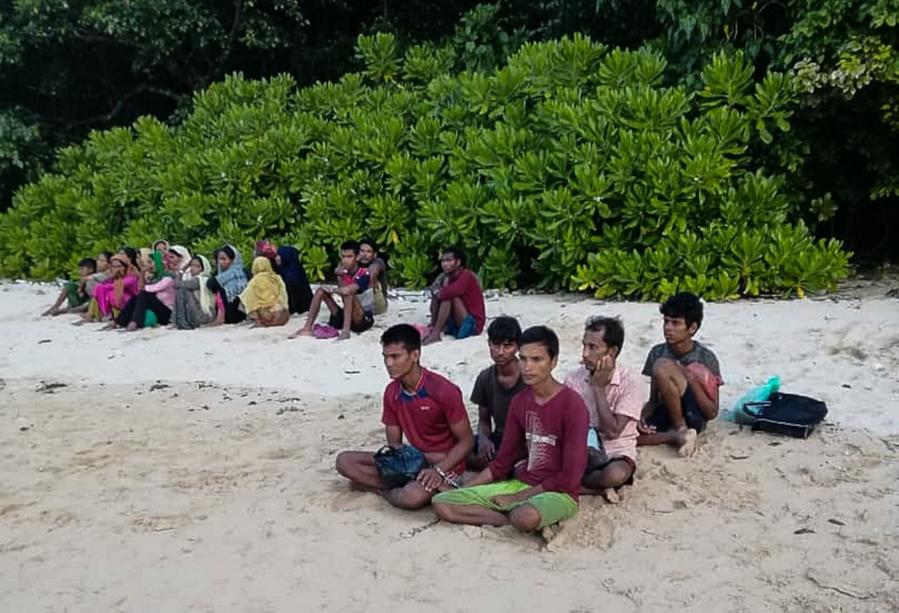 This undated handout photo released on July 27, 2020 by the Malaysian Maritime Enforcement Agency shows suspected Rohingya migrants detained in Malaysian territorial waters off the island of Langkawi. (PHOTO / AFP)
This undated handout photo released on July 27, 2020 by the Malaysian Maritime Enforcement Agency shows suspected Rohingya migrants detained in Malaysian territorial waters off the island of Langkawi. (PHOTO / AFP)
KUALA LUMPUR - As coronavirus infections surged in Malaysia this year, a wave of hate speech and misinformation aimed at Rohingya Muslim refugees from Myanmar began appearing on Facebook.
Alarmed rights groups reported the material to Facebook.
But six months later, many posts targeting the Rohingya in Malaysia remain on the platform, including pages such as “Anti Rohingya Club” and “Foreigners Mar Malaysia’s Image”, although those two pages were removed after Reuters flagged them to Facebook recently.
Facebook acknowledged in 2018 that its platform was used to incite violence against the Rohingya in Myanmar, and last year spent more than US$3.7 billion on safety and security on its platform
Comments still online in one private group with nearly 100,000 members included “Hope they all die, this cursed pig ethnic group”.
READ MORE: Remembering the Rohingya exodus
Facebook acknowledged in 2018 that its platform was used to incite violence against the Rohingya in Myanmar, and last year spent more than US$3.7 billion on safety and security on its platform.
But the surge of anti-Rohingya comment in Malaysia shows how xenophobic speech nonetheless persists.
“Assertions that Facebook is uncommitted to addressing safety and security are inaccurate and do not reflect the significant investment we’ve made to address harmful content on our platform,” a company spokeswoman told Reuters.
Reuters found more than three dozen pages and groups, including accounts run by former and serving Malaysian security officials, that featured discriminatory language about Rohingya refugees and undocumented migrants.
Dozens of comments encouraged violence.
Reuters found some of the strongest comments in closed private groups, which people have to ask to join. Such groups have been a hotbed for hate speech and misinformation in other parts of the world.
Facebook removed 12 of the 36 pages and groups flagged by Reuters, and several posts. Five other pages with anti-migrant content seen by Reuters in the last month were removed before Reuters queries.
“We do not allow people to post hate speech or threats of violence on Facebook and we will remove this content as soon as we become aware of it,” Facebook said.
Some of the pages that remain online contain comments comparing Rohingya to dogs and parasites. Some disclosed where Rohingya had been spotted and encouraged authorities and the public to take action against them.
WIDESPREAD HATE SPEECH
“This kind of hate speech can lead to physical violence and persecution of a whole group. We saw this in Myanmar,” said John Quinley, senior human rights specialist at Fortify Rights, an independent group focused on Southeast Asia.
Muslim-majority Malaysia was long friendly to the Rohingya, a minority fleeing violence in largely Buddhist Myanmar
“It would be irresponsible to not actively take down anti-refugee and anti-Rohingya Facebook groups and pages.”
Muslim-majority Malaysia was long friendly to the Rohingya, a minority fleeing violence in largely Buddhist Myanmar, and more than 100,000 Rohingya refugees live in Malaysia, even though it doesn’t officially recognise them as refugees.
But sentiment turned in April, with the Rohingya being accused of spreading the coronavirus. Hate speech circulated widely, including on Facebook – a platform used by nearly 70% of Malaysia’s 32 million people.
Rights groups and refugees said comments on Facebook helped escalate xenophobia in Malaysia.
ALSO READ: Rohingya politicians excluded from Myanmar election
“Malaysians who have lived with Rohingya refugees for years have started calling the cops on us, some have lost jobs. We are in fear all the time,” said Abu, a Rohingya refugee who did not want to give his full name fearing repercussions.
Another refugee who declined to be identified said he deactivated his Facebook account after his details were posted and Malaysians messaged him telling him to go back to Myanmar - from where he fled five years ago.
“Facebook has failed, they don’t understand how dangerous such comments can be,” he said, referring to posts he had seen supporting action in Myanmar against Rohingya.


